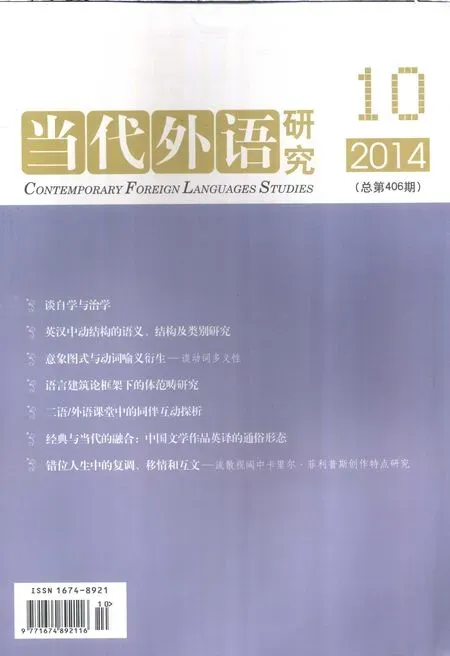Abstracts of Major Papers in This Issue
2014-03-29
s of Major Papers in This Issue
The Semantic-Syntactic Study and Classification of English and Chinese Middles, by ZHANG Zhiyi & NI Chuanbin, p. 5
The former studies concerning middles did not reach agreement on the syntactic and semantic feature of this structure. Starting from the structural differences between passives and middles, this study attempts to prove that there exists neither explicit nor implicit external argument in middles. Semantically, the absence of the external argument is caused by the conceptual eventiveness feature of the main verbs. Middles ought to contain adjuncts indicating property and mode. The prepositional phrase possibly existing in middles is adjunct. In addition, the present study also defines and classifies English and Chinese middles based on structure.
Image Schema and Development of Verbal Metaphor Meaning: On the Verbal Polysemy, by PENG Yuhai & LV Ye, p. 11
Image schema is an important connotation symbol of verbal metaphor mechanism, and it plays a characteristic role in developing process of verbal metaphor meaning. Based on thinking and comprehending of image schema of verb metaphor, we will concretely analyse cognitive semantic essence of the image schema, observe and study its subcategory manifestation and cognitive operating in verbal metaphor polysemy. We attempt to fully show active cognitive functions of image schema in mental representing and semantic constructing of word meaning, trying to give a new revelation to approaching Russian verbal metaphor and polysemy from the new angle of image schema.
A Parametric Approach to the Typology of Serial Verb Constructions, by YANG Yongzhong, p. 17
The present study is mainly concerned with the types of serial verb constructions in terms of parameters. It is argued that the word order typology and the variation of serial verb constructions bear on the parametric variation of verb movement under the framework of generative grammar. The parameters of verb movement follow the order: the object/verb of SOV serial verb constructions> the object/verb of SVO serial verb constructions> the object/verb of single verb constructions. The further the verb moves, the more patienthood the object displays and the more tendency the constructions display to violate Temporal Iconicity. In other words, serial verb constructions arise from verb movement. The above contention is supported by independent evidence from linguistic typology, the morphology of aspect markers and the distribution of indefinite objects in serial verb constructions.
An Exploration of Peer Interaction in Second/Foreign Language Classrooms, by XU Jinfen & YE Shengshan, p. 31
The present paper explores four aspects related to peer interaction in second/foreign language classrooms from both theoretical and empirical perspectives: definitions, functions, limitations as well as implications for foreign language teaching. In general, the strengths of peer interaction are shown in three aspects: (1) it maximizes learners’ opportunities to experiment with language; (2) it provides contexts for learners to correct language mistakes; (3) it promotes fluency in learners’ production. Limitations with peer interaction are also discussed. For example, learners’ current second language proficiency level allows limited assistance to peers. It is suggested that even though teachers do not get involved in peer interaction, their important roles can never be neglected. Teachers should look for ways to optimize peer interaction in order to maximize effectiveness of peer interaction in foreign language classrooms.
An Empirical Study of Web-based Cultivation of Students’ Pragmatic Competence, by LIU Jilin & MO Aiping, p. 37
Within the theoretic framework of Memetics, this research establishes an in-class and out-class pragmatic teaching model by making use of relative internet resources to explore the cultivation of college English majors’ pragmatic competence. Then it conducts an empirical study of this model to test its effect on the development of learners’ pragmatic competence. The results reveal that the experiment group has better effect than the control group in enhancing the learners’ pragmatic competence by adopting this model, indicating that the effectiveness of such a model has far more implications for research on foreign language teaching, innovative integration of the exploration and the cultivation of translator competence of students with Bachelor Degree of Arts in Translation in China.
Leading the Classics to Contemporary Readership: The Popular Approaches to Chinese Literature in English Translation, by WANG Jiankai, p. 49
Using pictures to decode Chinese literature in English translation has been a newly-adopted strategy in disseminating Chinese culture and literature overseas. Comics, paining, cartoons and even audio-visual materials are applied to unfold ancient Chinese texts in the bilingual form, making the reading a more pleasant experience while the profound concepts in the original texts are well interpreted through the illustrative expressions. In doing so, it becomes possible for overseas readers and children to appreciate Chinese classic literature. Such efforts also demonstrate that the mainland publishers are now better aware of the market and the target readers according to whose reading habits and interests the Chinese books in English translation are launched. The result has proven a definite success for this strategy, pointing out the direction for further endeavor in the future.
Polyphony, Empathy and Intertextuality in Dislocation: Caryl Phillips’s Characteristics of Creation, by ZHANG Jianping, p. 65
Caryl Phillips is considered as one of the most famous and leading Diaspora writers in the world, with “dislocation” standing as the common theme both in his works and his life. “Dislocation” means experiences among different districts and diverse cultures, which sometimes lead the feelings of unbelongs of the desolators. Despite of the complication reflected in Phillips’s literary world, his works present three characteristics, namely polyphony, empathy and intertextuality, each of which is developed on the basis of “dislocation”.
